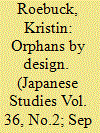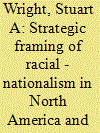| Srl | Item |
| 1 |
ID:
191634


|
|
|
|
|
| Summary/Abstract |
In January 2004, residents of Zambia’s capital, Lusaka, were treated to a disturbing sight. Over 200 members of the governing Movement for Multiparty Democracy party marched through the streets of the capital carrying a mock coffin bearing the name of Roy Clarke, a prominent newspaper satirist and white British national who had been a permanent resident in the country since the early 1960s. The protesters accused Clarke of insulting and defaming President Levy Mwanawasa in his previous column and demanded his immediate deportation. The Minister of Home Affairs obliged, but the satirist successfully challenged his deportation in Zambia’s courts. Drawing from newspaper sources, court documents, and interviews with key informants, this article shows that these protests were anything but a spontaneous demonstration of public outrage. Instead, they had been carefully orchestrated by Mwanawasa and his close allies to bolster Mwanawasa’s beleaguered presidency. The article argues that deportation orders and racial nationalism against racial minorities are strategies adopted by political elites during periods of weakness, even when these ideas have little or no popular support. More broadly, we argue that the status of racial minorities and other foreigners in Zambia is often provisional, depending on political considerations.
|
|
|
|
|
|
|
|
|
|
|
|
|
|
|
|
| 2 |
ID:
149260


|
|
|
|
|
| Summary/Abstract |
At the end of the Allied occupation in 1952, the Japanese press reported that two hundred thousand ‘mixed-blood’ children had been fathered and abandoned by foreign (mostly American) soldiers in Japan. Japanese commentators often converged on a single solution: the expulsion of all foreign troops and all ‘mixed’ children from Japan. Although most scholars treat the 1950s sense of ‘crisis’ surrounding ‘mixed’ children as a product of concern for their welfare, the ‘crisis’ is better understood as a complexly co-authored moral panic. Opposition politicians deployed wrath and fear over ‘blood mixing’ to discredit the dominant Liberal Party and its alliance with the United States. Meanwhile, ideological activists and mass media circulated false facts to present ‘mixed’ families as doomed and dangerous. Moral panic over ‘mixed-blood children’ fostered a ‘pure-blood’ identity in Japan after World War II and helped reconstruct Japanese nationalism on a new basis: that of the ‘pure’ race rather than the failed state.
|
|
|
|
|
|
|
|
|
|
|
|
|
|
|
|
| 3 |
ID:
087760


|
|
|
|
|
| Publication |
2009.
|
| Summary/Abstract |
Following the deadly Oklahoma City bombing in 1995, far-right racialist leaders responded rapidly to changes in the political environment, disavowing militia and Patriot violence and exploiting increased public concerns about immigration and the growth of nonwhite populations. Evidence suggests that Patriot movement demobilization may have actually helped to swell the ranks of racial-nationalists. As attention to political violence shifted to international terrorism in the aftermath of September 11, racial-nationalist movement actors again moved quickly to seize the opportunity. The strategic framing of the crisis by racial-nationalist leaders revealed the existence of a transnational network of allies promoting a two-pronged message, 1) a virulent anti-Semitic assault on pro-Israel U.S. foreign policy and 2) a broadside on immigration and multiculturalism. The lineaments of these transnational networks are analyzed in an effort to explain a "trajectory of contention" regarding this emergent movement. Possible links between racial-nationalists and Islamic militants are also explored.
|
|
|
|
|
|
|
|
|
|
|
|
|
|
|
|